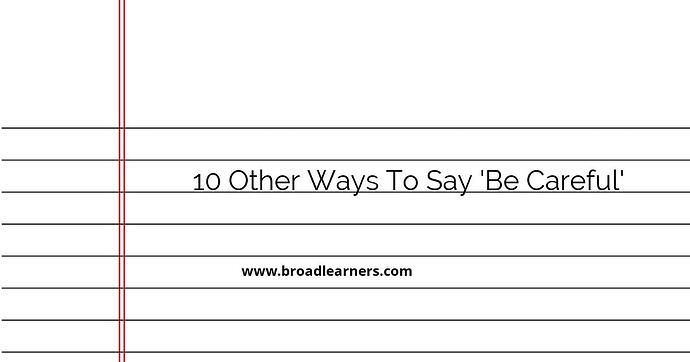When you want to warn someone or advise them to be cautious, saying 'be careful' is a common phrase. However, there are several alternative ways to convey the same message. Here are 10 other ways to say 'be careful':
- Exercise caution
- Watch out
- Take care
- Be cautious
- Stay alert
- Be mindful
- Use caution
- Proceed with caution
- Be on your guard
- Be wary
Each of these alternatives can be used in different contexts to express the need for caution. Let's explore each one with examples:
1. Exercise caution
This phrase is often used to advise someone to be careful in a specific situation. It implies that they need to be aware of potential risks or dangers.
Example: "I suggest you exercise caution while crossing the busy intersection."
2. Watch out
This is a more direct and urgent way of warning someone to be careful. It implies that there is an immediate threat or danger.
Example: "Watch out for the slippery steps, they can be dangerous."
3. Take care
This is a general phrase used to express concern for someone's safety. It can be used in various situations to remind someone to be cautious.
Example: "Take care while driving on icy roads."
4. Be cautious
This phrase emphasizes the need for someone to be careful and attentive. It suggests that there may be potential risks or hazards.
Example: "Be cautious when handling fragile glassware."
5. Stay alert
This phrase is often used to remind someone to be watchful and attentive. It implies the need to be aware of one's surroundings.
Example: "Stay alert while walking alone at night."
6. Be mindful
This phrase encourages someone to be mindful of their actions and surroundings. It implies being aware of potential risks or consequences.
Example: "Be mindful of your personal belongings in crowded areas."
7. Use caution
This phrase advises someone to use caution and be careful when engaging in a specific activity or situation.
Example: "Use caution when handling sharp objects."
8. Proceed with caution
This phrase suggests that someone should proceed carefully and attentively. It implies that there may be potential obstacles or dangers ahead.
Example: "Proceed with caution when entering the construction site."
9. Be on your guard
This phrase implies the need to be vigilant and prepared for potential threats or dangers.
Example: "Be on your guard when walking through unfamiliar neighborhoods."
10. Be wary
This phrase suggests that someone should be cautious and skeptical. It implies the need to be cautious of potential risks or deceit.
Example: "Be wary of strangers offering unsolicited help."
By using these alternative phrases, you can effectively communicate the need for caution in various situations. Choose the phrase that best suits the context and tone of your message.
Did I miss anything? Respond below
